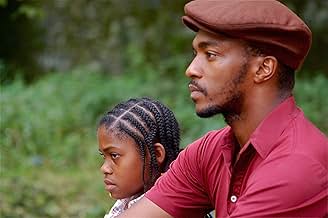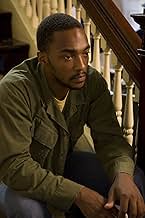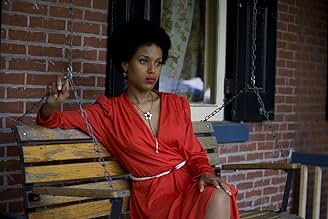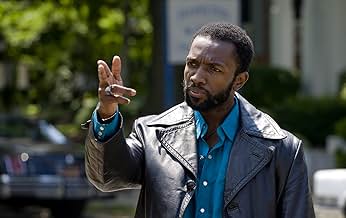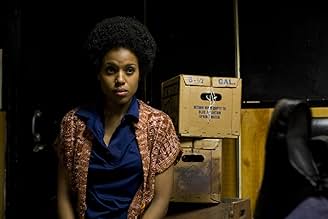IMDb-BEWERTUNG
6,2/10
1890
IHRE BEWERTUNG
Im Jahr 1976 werden komplexe politische und emotionale Kräfte in Bewegung gesetzt, als ein junger Mann in das rassistisch geprägte Viertel von Philadelphia zurückkehrt, in dem er während der... Alles lesenIm Jahr 1976 werden komplexe politische und emotionale Kräfte in Bewegung gesetzt, als ein junger Mann in das rassistisch geprägte Viertel von Philadelphia zurückkehrt, in dem er während der Black-Power-Bewegung aufgewachsen ist.Im Jahr 1976 werden komplexe politische und emotionale Kräfte in Bewegung gesetzt, als ein junger Mann in das rassistisch geprägte Viertel von Philadelphia zurückkehrt, in dem er während der Black-Power-Bewegung aufgewachsen ist.
- Auszeichnungen
- 8 Gewinne & 19 Nominierungen insgesamt
Empfohlene Bewertungen
"Night Catches Us" is a movie written and directed by Tanya Hamilton. It seeks to tell the story of a Philadelphia neighborhood and how it was shattered by the police killing of a Black Panther Party member. The movie takes place in 1976 where we see Marcus Washington (Anthony Mackie) returning home to a cold welcome for his father's funeral. There are those who are angry with him for running away, and those who are angry with him for being a snitch. Nothing is really clear to begin with though it becomes a little clearer later on. He's at odds with Dwayne Miller (Jamie Hector) over "snitching," and he's at odds with his brother Bostic (Tariq Trotter) and his secret flame Patricia (Kerry Washington) over disappearing. By the end we find out why he was labeled a snitch and why he disappeared.
This movie suffered from a weak script and an uncompelling plot. It's not a good thing when the best parts of your movie are archive footage and photos. It looked as if Tanya Hamilton was attempting to pay a tribute to the Black Panther Party, but she did the complete opposite. What we saw from ex-members and current wannabes was an organization that left people broken and confused. It was like all ex-members and allies were directionless without the Party, kind of like this movie. As if the legacy of the Party was poor, angry Black folks who were destined to remain poor and angry.
The movie attempted to be deep and poignant with the partial conversations and emotional pleas, but it never got past the surface of what the Party meant and what they were about. "Night Catches Us" may have been about a prodigal son returning, but he and all of the other characters were so hollow. There was nothing to them except that they were Black, had a connection to the Party, and had a death hanging over them of one of their members years ago.
It's hard to say just what Hamilton intended with this movie. She got quality actors in Mackie, Washington, and Hector, but that only takes you so far. Given the subject matter this movie could've been, and should've been so much better.
This movie suffered from a weak script and an uncompelling plot. It's not a good thing when the best parts of your movie are archive footage and photos. It looked as if Tanya Hamilton was attempting to pay a tribute to the Black Panther Party, but she did the complete opposite. What we saw from ex-members and current wannabes was an organization that left people broken and confused. It was like all ex-members and allies were directionless without the Party, kind of like this movie. As if the legacy of the Party was poor, angry Black folks who were destined to remain poor and angry.
The movie attempted to be deep and poignant with the partial conversations and emotional pleas, but it never got past the surface of what the Party meant and what they were about. "Night Catches Us" may have been about a prodigal son returning, but he and all of the other characters were so hollow. There was nothing to them except that they were Black, had a connection to the Party, and had a death hanging over them of one of their members years ago.
It's hard to say just what Hamilton intended with this movie. She got quality actors in Mackie, Washington, and Hector, but that only takes you so far. Given the subject matter this movie could've been, and should've been so much better.
Night Catches Us (2010) is a movie I recently watched on Tubi. The storyline follows a man who returns home to his neighborhood after his father passes away. He wants to help his family fix-up the house but quickly comes to the realization he isn't wanted around by his former friends or family. There is one single mother who appreciates who he was and who he is and together they try to overcome some of their inner demons. This movie is directed by Tanya Hamilton (The Chi) in her directorial debut and stars Kerry Washington (Scandal), Anthony Mackie (Avengers), Ron Simons (27 Dresses) and Tariq Trotter (Yelling to the Sky). The storyline for this picture is very interesting and fun to watch unfold. There's numerous mysteries of each other's pasts for the two main characters that keep the audience intrigued. The acting is very good as is the cinematography, settings and backdrops. The character interactions also have the appropriate level of intensity. Overall, this is far from one of the best movies in this genre but is still worth a viewing. I'd score this a 6.5-7/10.
I'd encourage anyone interested in watching good acting and film-making to watch "Night Catches Us".
The movie is set in 1976, in Philadelphia, and it is not "Rocky's" S. Philadelphia. The main characters have all had experience/involvement in the Black Panther movement, and the movie cuts a path through the complex feelings and realities that have evolved since they were once involved with it.
It's one of those films that revolves around a core group of characters who've all turned into somewhat different people from when they first knew each other. The dynamic is even more intense because each of the main characters has a tie-in to someone who was obviously a leader or loved one -- indeed it was his death years earlier that led the group to disperse.
I'm kinda bummed that awards seasons might be passing by this gem. Kerry Washington is great, but it's Anthony Mackie's film; he has an intensity and dignity. No overwrought acting.
The movie is set in 1976, in Philadelphia, and it is not "Rocky's" S. Philadelphia. The main characters have all had experience/involvement in the Black Panther movement, and the movie cuts a path through the complex feelings and realities that have evolved since they were once involved with it.
It's one of those films that revolves around a core group of characters who've all turned into somewhat different people from when they first knew each other. The dynamic is even more intense because each of the main characters has a tie-in to someone who was obviously a leader or loved one -- indeed it was his death years earlier that led the group to disperse.
I'm kinda bummed that awards seasons might be passing by this gem. Kerry Washington is great, but it's Anthony Mackie's film; he has an intensity and dignity. No overwrought acting.
"Night Catches Us" is the best art-house film I've seen in several months. In fact it bests a lot of the current main-screen fare. It deserves better than the quiet and uneven release it seems destined for.
I saw it back-to-back with the Oscar contender "The King's Speech". It balanced the double bill reasonably well. Although "The King's Speech" is of course superior, the comparison wasn't simply ridiculous.
I saw it twice ...which I often do with films I really like, as I tend to miss too many things the first time.
It's not moralistic. Both sides of survival vs. justice, violence vs. pacifism, united front vs. paranoia, victims vs. victimizers, and this generation vs. the next generation are portrayed sympathetically. Although at first glance one particular style of being seems to be being touted over the others, just a little reflection reveals that the film actually revels in moral ambiguity. Some characters manage to stay on the good side of the respectability line at all times, even while their inner demons are picked up and expressed -sometimes in socially unacceptable ways- by others around them. The camera notices more latent contradictions than the story ever delves into. For example the reverend was apparently beloved by the neighborhood, yet also lived in by far the finest house in the whole area.
The film isn't a polemic and doesn't seem to consciously attempt to portray cops in a bad light. Yet it doesn't shy away from sketches of substantial police bad attitude and violence.
"Night Catches Us" makes liberal use of art-house stylistic conventions. For example the confused, tangled, and partially submerged thoughts of a character are portrayed not by talking about them or even by seeing them in action, but by long leisurely shots from underneath of the crossed branches of overgrown vegetation. For another example, a character's longing for stability and tranquility is portrayed by lengthy shots of the proverbial babbling brook.
I wasn't irritated by the pacing. The film is by no means an action flick or a taut thriller, but I didn't find it like watching paint dry either. I tend to like slower paced films anyway (which of course doesn't mean everybody else will too:-). The most similarly paced movie that comes to mind is Clint Eastood's recent "Hereafter"; if you thought that was impossibly slow you'll probably have the same reaction to "Night Catches Us", but if that character exposition and portrayal of small events grabbed you this likely will too.
All the action takes place over just a few days in 1976. A block of important events that happened about a decade earlier is described mainly through bits of dialog. There are no visual flashbacks nor dream sequences (except of course for the occasional interspersed archival Black Panthers footage).
I found the acting quite good. It doesn't bowl you over as the greatest thing you've seen in years; but it's by no means "just workmanlike". Quite often meaning is communicated not by dialog but by subtle body language or facial expressions, which the actors seem fully up to. Both the individual characters and the chemistry between the characters are believably convincing.
I found the situation (or plot if you prefer to think of it that way) simple and complex at the same time. It's simple in that once you finally grasp it you can describe the whole thing in one short paragraph, and in that if you're one of those people who instantly "get" most movie clues you might be able to divine the whole thing well in advance. On the other hand it's complex in that it's revealed only one tiny bit at a time -sometimes in dialog and sometimes visually- so the whole movie can become a "mystery" to be solved if that's your preference.
I saw it back-to-back with the Oscar contender "The King's Speech". It balanced the double bill reasonably well. Although "The King's Speech" is of course superior, the comparison wasn't simply ridiculous.
I saw it twice ...which I often do with films I really like, as I tend to miss too many things the first time.
It's not moralistic. Both sides of survival vs. justice, violence vs. pacifism, united front vs. paranoia, victims vs. victimizers, and this generation vs. the next generation are portrayed sympathetically. Although at first glance one particular style of being seems to be being touted over the others, just a little reflection reveals that the film actually revels in moral ambiguity. Some characters manage to stay on the good side of the respectability line at all times, even while their inner demons are picked up and expressed -sometimes in socially unacceptable ways- by others around them. The camera notices more latent contradictions than the story ever delves into. For example the reverend was apparently beloved by the neighborhood, yet also lived in by far the finest house in the whole area.
The film isn't a polemic and doesn't seem to consciously attempt to portray cops in a bad light. Yet it doesn't shy away from sketches of substantial police bad attitude and violence.
"Night Catches Us" makes liberal use of art-house stylistic conventions. For example the confused, tangled, and partially submerged thoughts of a character are portrayed not by talking about them or even by seeing them in action, but by long leisurely shots from underneath of the crossed branches of overgrown vegetation. For another example, a character's longing for stability and tranquility is portrayed by lengthy shots of the proverbial babbling brook.
I wasn't irritated by the pacing. The film is by no means an action flick or a taut thriller, but I didn't find it like watching paint dry either. I tend to like slower paced films anyway (which of course doesn't mean everybody else will too:-). The most similarly paced movie that comes to mind is Clint Eastood's recent "Hereafter"; if you thought that was impossibly slow you'll probably have the same reaction to "Night Catches Us", but if that character exposition and portrayal of small events grabbed you this likely will too.
All the action takes place over just a few days in 1976. A block of important events that happened about a decade earlier is described mainly through bits of dialog. There are no visual flashbacks nor dream sequences (except of course for the occasional interspersed archival Black Panthers footage).
I found the acting quite good. It doesn't bowl you over as the greatest thing you've seen in years; but it's by no means "just workmanlike". Quite often meaning is communicated not by dialog but by subtle body language or facial expressions, which the actors seem fully up to. Both the individual characters and the chemistry between the characters are believably convincing.
I found the situation (or plot if you prefer to think of it that way) simple and complex at the same time. It's simple in that once you finally grasp it you can describe the whole thing in one short paragraph, and in that if you're one of those people who instantly "get" most movie clues you might be able to divine the whole thing well in advance. On the other hand it's complex in that it's revealed only one tiny bit at a time -sometimes in dialog and sometimes visually- so the whole movie can become a "mystery" to be solved if that's your preference.
Night Catches Us (2010)
A really fascinating look at an African-American reality in Philadelphia in 1976. The plot hook is more sensational than the movie itself—a former Black Panther returning home has to adjust to regular life and accusations of tattling. What really grips you, though, is the "regular life" part, because the acting and direction make this all feel honest and revealing. A slice of life done well.
If the core of the movie is how Blacks of different attitudes and philosophies learn to get along (and not get along) with each other, there is also the more expected acrimony between the Black community and the mostly White cops patrolling it. It's hard to know how accurate this part is, because here we are shown clichés of some very dumb and mean and hardheaded white cops, and maybe that was the norm. I'd like to think that some other movies have it right when there are those bad eggs on the force, but that many make an effort to get along and be reasonable with the people they are protecting.
But maybe one message of the movie taken whole is just how different it was back then, in the shadow of the truly radical and violent 1960s, as the Muslim influence was rising, as power was promising to shift more evenly between groups but was lurching too slowly. Maybe it was just filled with such distrust it led to caricatures for real. There are several segments of archival footage of Panthers and other protesting, and the gritty roughness of those scenes reveals some kind of glossing over of the situation for this fictional version made 35 years later.
The leading actor, Anthony Mackie, and leading actress, Kerry Washington, are both likable and excellent. You might say too likable and excellent—there is a modern feel to their demeanors that's hard to put your finger on. But they're both a joy to watch act and interact. The intentions are low key, and the result is easy going despite the tensions around them. It's a love story after all! Writer and director Tanya Hamilton is making her first feature film here, and she makes the most of her modest intentions.
As a commentary on race relations it is nearly the opposite of Spike Lee's approaches in their highly produced flair. And whatever the limitations of the film and its script, it has the net gain of a feeling of sincerity. Which goes a long way.
A really fascinating look at an African-American reality in Philadelphia in 1976. The plot hook is more sensational than the movie itself—a former Black Panther returning home has to adjust to regular life and accusations of tattling. What really grips you, though, is the "regular life" part, because the acting and direction make this all feel honest and revealing. A slice of life done well.
If the core of the movie is how Blacks of different attitudes and philosophies learn to get along (and not get along) with each other, there is also the more expected acrimony between the Black community and the mostly White cops patrolling it. It's hard to know how accurate this part is, because here we are shown clichés of some very dumb and mean and hardheaded white cops, and maybe that was the norm. I'd like to think that some other movies have it right when there are those bad eggs on the force, but that many make an effort to get along and be reasonable with the people they are protecting.
But maybe one message of the movie taken whole is just how different it was back then, in the shadow of the truly radical and violent 1960s, as the Muslim influence was rising, as power was promising to shift more evenly between groups but was lurching too slowly. Maybe it was just filled with such distrust it led to caricatures for real. There are several segments of archival footage of Panthers and other protesting, and the gritty roughness of those scenes reveals some kind of glossing over of the situation for this fictional version made 35 years later.
The leading actor, Anthony Mackie, and leading actress, Kerry Washington, are both likable and excellent. You might say too likable and excellent—there is a modern feel to their demeanors that's hard to put your finger on. But they're both a joy to watch act and interact. The intentions are low key, and the result is easy going despite the tensions around them. It's a love story after all! Writer and director Tanya Hamilton is making her first feature film here, and she makes the most of her modest intentions.
As a commentary on race relations it is nearly the opposite of Spike Lee's approaches in their highly produced flair. And whatever the limitations of the film and its script, it has the net gain of a feeling of sincerity. Which goes a long way.
Wusstest du schon
- WissenswertesThis movie reunites Anthony Mackie and Kerry Washington who previously starred together in Spike Lee's 2004 film 'She Hate Me.'
- PatzerThe film is supposed to take place in 1975, but the blue Chevy Caprice police car is a 1986-1990 model.
- VerbindungenReferenced in IMDb's 20th Anniversary Star of the Day: Anthony Mackie (2010)
Top-Auswahl
Melde dich zum Bewerten an und greife auf die Watchlist für personalisierte Empfehlungen zu.
- How long is Night Catches Us?Powered by Alexa
Details
- Erscheinungsdatum
- Herkunftsland
- Offizielle Standorte
- Sprache
- Auch bekannt als
- Stringbean and Marcus
- Drehorte
- Produktionsfirmen
- Weitere beteiligte Unternehmen bei IMDbPro anzeigen
Box Office
- Bruttoertrag in den USA und Kanada
- 76.185 $
- Eröffnungswochenende in den USA und in Kanada
- 13.562 $
- 5. Dez. 2010
- Weltweiter Bruttoertrag
- 76.185 $
- Laufzeit1 Stunde 30 Minuten
- Farbe
- Sound-Mix
Zu dieser Seite beitragen
Bearbeitung vorschlagen oder fehlenden Inhalt hinzufügen

Oberste Lücke
By what name was Night Catches Us (2010) officially released in India in English?
Antwort

